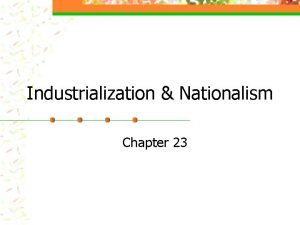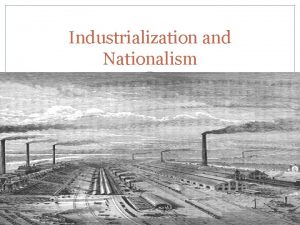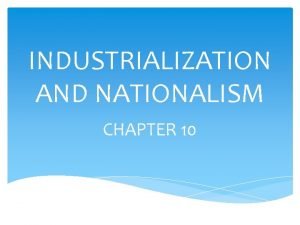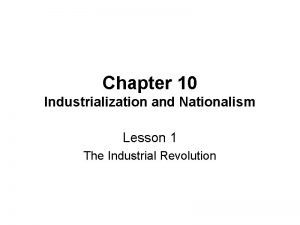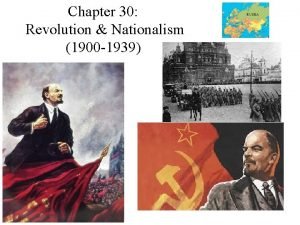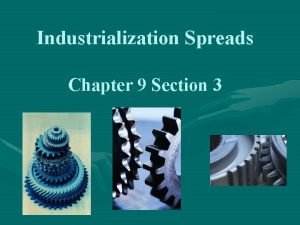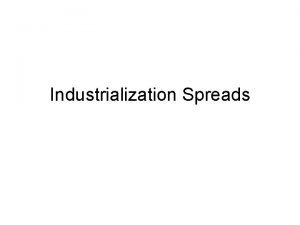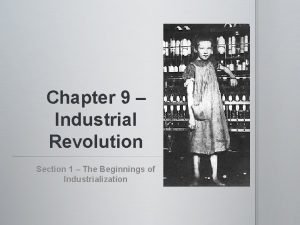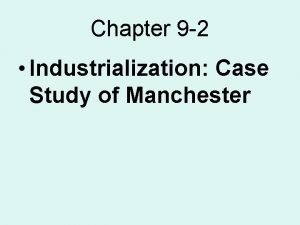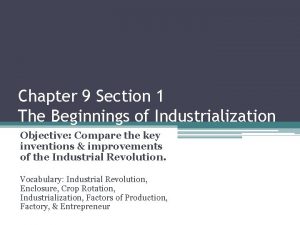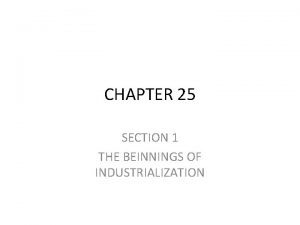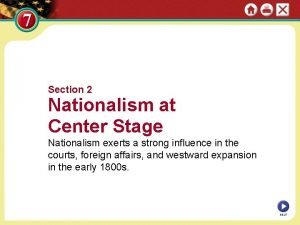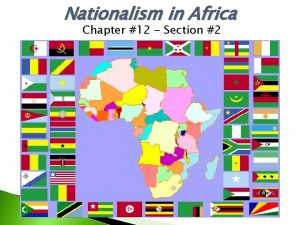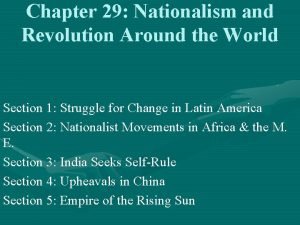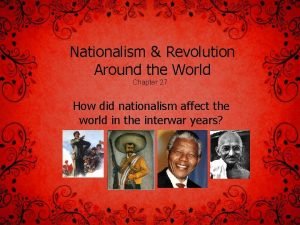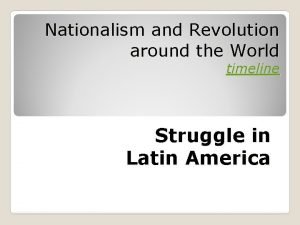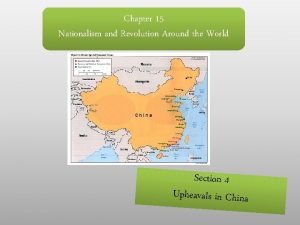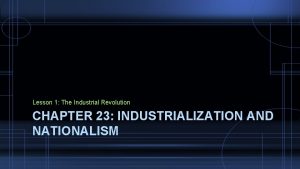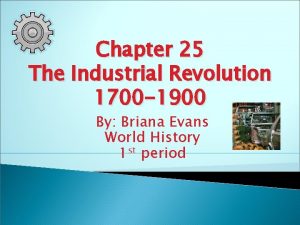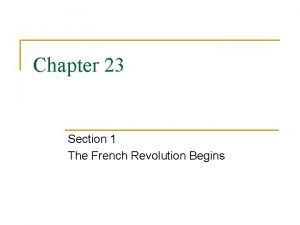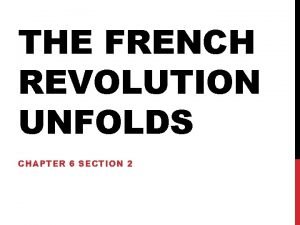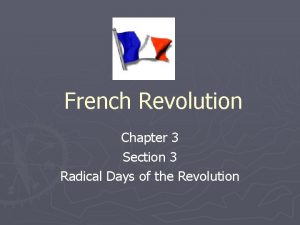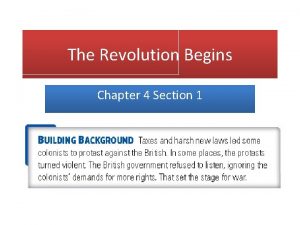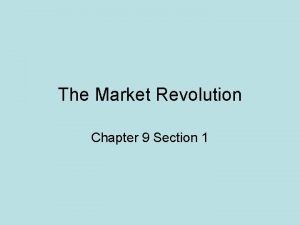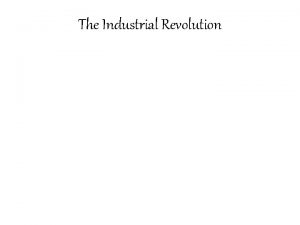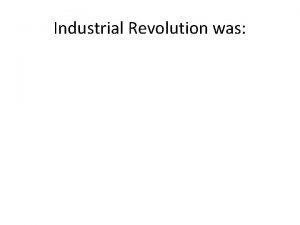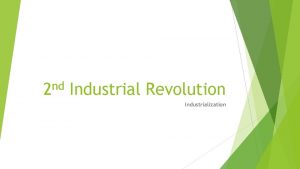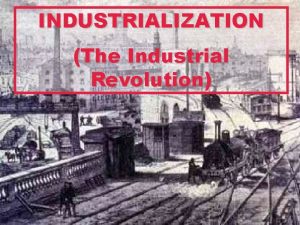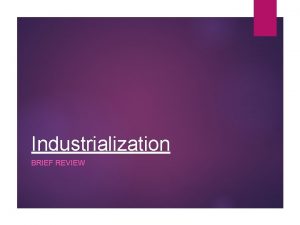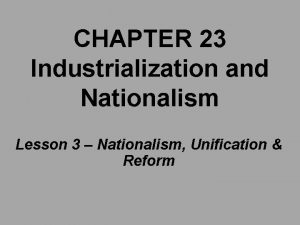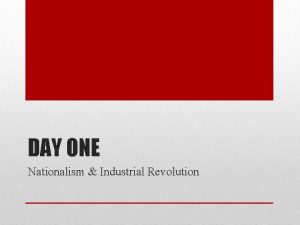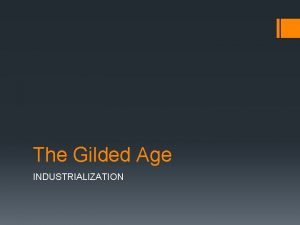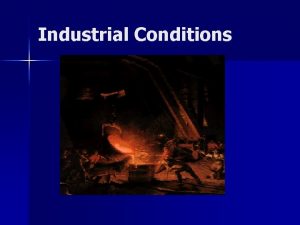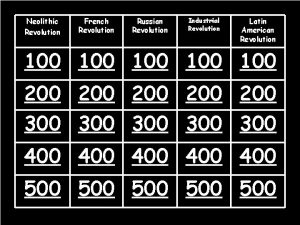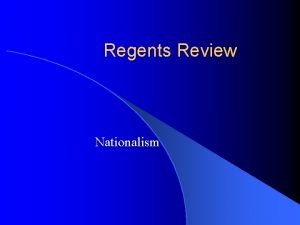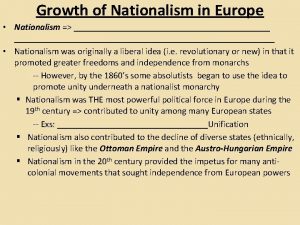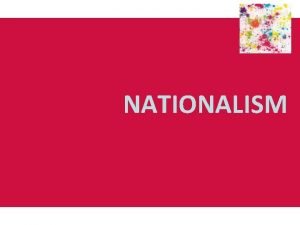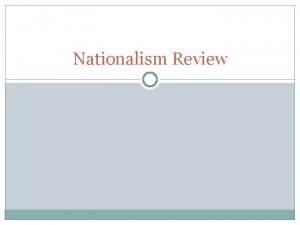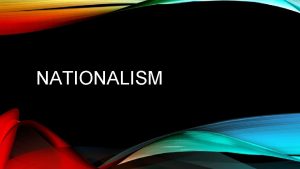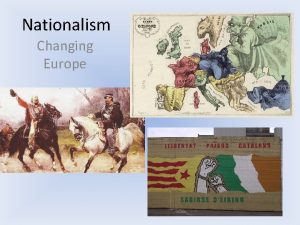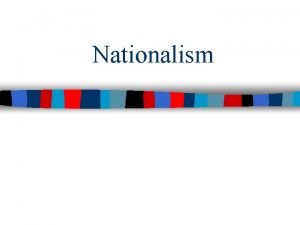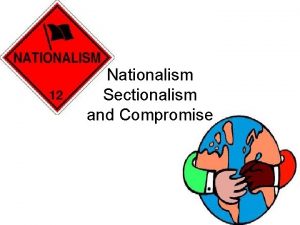Industrialization Nationalism Chapter 23 Industrial Revolution Section 1




























- Slides: 28

Industrialization & Nationalism Chapter 23

Industrial Revolution Section 1

Industrial Revolution in Great Britain n 1780 s n 5 n n n Factors Agricultural practices Population growth Supply of money Natural resources Market supply

n Cotton industry n Flying shuttle n James Hargreaves- spinning jenny n Edmund Cartwright- water powered loom n James Watt- steam engine n Coal production n Henry Cort- puddling

n. Railroads n. The Rocket n. Factories & labor system

Spread of Industrialization n. Europe n. North America n. Robert Fulton- Clermont n. Railroad


Reaction & Revolution Section 2

Congress of Vienna n Klemens von Metternich n Principle of legitimacy n Balance of power

Conservative Order n. Conservatism n. Concert of Europe n. Principle of intervention

Forces of Change n Liberalism n Nationalism n France- Charles X; Louis-Philippe n Belgium, Poland, & Italy

Revolutions of 1848 n French Revolution n Louis-Philippe overthrown n Constituent Assembly- universal male suffrage n Charles Louis Napoleon Bonaparte (Louis-Napoleon) elected leader of France

n Trouble in Germany n German Confederation n Revolutions in Central Europe n Austrian Empire (multinational state) n Revolts in Italy n 9 Italian states n Conservative rule reestablished because liberals too divided over goals

National Unification & National States Section 3

End of the Concert of Europe n Crimean War n Russia wanted land in the Balkans (controlled by the Ottoman Empire which was in decline) n Give Russia access to Mediterranean Sea n 1853 - Russia invades Moldavia; Ottoman declare war on Russia; France & Great Britain declare war on Russia n 1856 - Russia seeks peace in the Treaty of Paris


n Russia & Austria had been 2 main powers, now they were enemies n Austria didn’t help Russia in the war because they also wanted the Balkans n Russia lost & became isolated for 20 years or so n Austria had no allies that were powerful n Ended the Concert of Europe

Italian Unification n King Victor Emmanuel II- king of Piedmont n Camillo di Cavour- prime minister n Giuseppe Garibaldi- Red Shirts n September 21, 1870 - Rome became capital of united Italy

German Unification n. Militarism n. King William I n. Otto von Bismarck n. Realpolitik n. Franco-Prussian War n. Kaiser

Reform in Europe n Queen Victoria- Great Britain n British North America Act (Canada) n France n Louis-Napoleon n Plebiscite n Second Empire

n. Austria Compromise of 1867 n. Russia n Czar Alexander II n Emancipation n Alexander III n

Culture: Romanticism & Realism Section 4

Romanticism Emphasized feelings, emotion & imagination n Mary Shelley- Frankenstein n Edgar Allen Poe- short stories n Artists: n art was reflection of inner feelings n abandoned classical reason for warmth & emotion n Eugene Delacroix- French n Ludwig van Beethoven- composer n


New Scientific Ideas Edward Jenner- small pox vaccine n Louis Pasteur- germ theory n Dmitry Medeleyev- periodic table n Michael Faraday- electric current n Secularization- indifference to religious consideration n Charles Darwin- organic evolution; Origin of n Species n Natural selection- survival of the fittest

Realism- viewing the world as it really is n Gustave Flaubert- Madame Bovary n Charles Dickens- Oliver Twist; David n Copperfield, Tale of Two Cities n Gustave Courbet- most famous realist artist


 Industrialization and nationalism chapter 23
Industrialization and nationalism chapter 23 Lesson quiz 10-2 industrialization and nationalism answers
Lesson quiz 10-2 industrialization and nationalism answers Chapter 10 industrialization and nationalism
Chapter 10 industrialization and nationalism Industrialization and nationalism lesson 1
Industrialization and nationalism lesson 1 Russian revolution vocabulary
Russian revolution vocabulary Chapter 9 section 3 industrialization spreads answer key
Chapter 9 section 3 industrialization spreads answer key Chapter 9 section 3 industrialization spreads
Chapter 9 section 3 industrialization spreads Chapter 9 section 3 industrialization spreads answer key
Chapter 9 section 3 industrialization spreads answer key The beginning of industrialization chapter 9 section 1
The beginning of industrialization chapter 9 section 1 Chapter 9 section 2 industrialization case study manchester
Chapter 9 section 2 industrialization case study manchester Chapter 9 section 1 the beginnings of industrialization
Chapter 9 section 1 the beginnings of industrialization Spinning mule long term effects
Spinning mule long term effects Chapter 7 section 2 nationalism at center stage
Chapter 7 section 2 nationalism at center stage Chapter 7 section 2 nationalism at center stage
Chapter 7 section 2 nationalism at center stage How did gibbons v ogden promote nationalism
How did gibbons v ogden promote nationalism Chapter 29: nationalism around the world answers
Chapter 29: nationalism around the world answers When did mao take over china
When did mao take over china Nationalism and revolution around the world
Nationalism and revolution around the world Nationalism and revolution around the world
Nationalism and revolution around the world Chapter 23 lesson 1 the industrial revolution
Chapter 23 lesson 1 the industrial revolution Chapter 25 the industrial revolution
Chapter 25 the industrial revolution Chapter 6 section 1 the scientific revolution
Chapter 6 section 1 the scientific revolution Chapter 7 section 1 the french revolution begins
Chapter 7 section 1 the french revolution begins Chapter 23 section 1 the french revolution begins worksheet
Chapter 23 section 1 the french revolution begins worksheet Chapter 6 section 2 the french revolution unfolds
Chapter 6 section 2 the french revolution unfolds Chapter 6 section 4 the american revolution
Chapter 6 section 4 the american revolution Red “liberty caps and tricolor”
Red “liberty caps and tricolor” May 1775
May 1775 Chapter 9 section 1 the market revolution
Chapter 9 section 1 the market revolution
